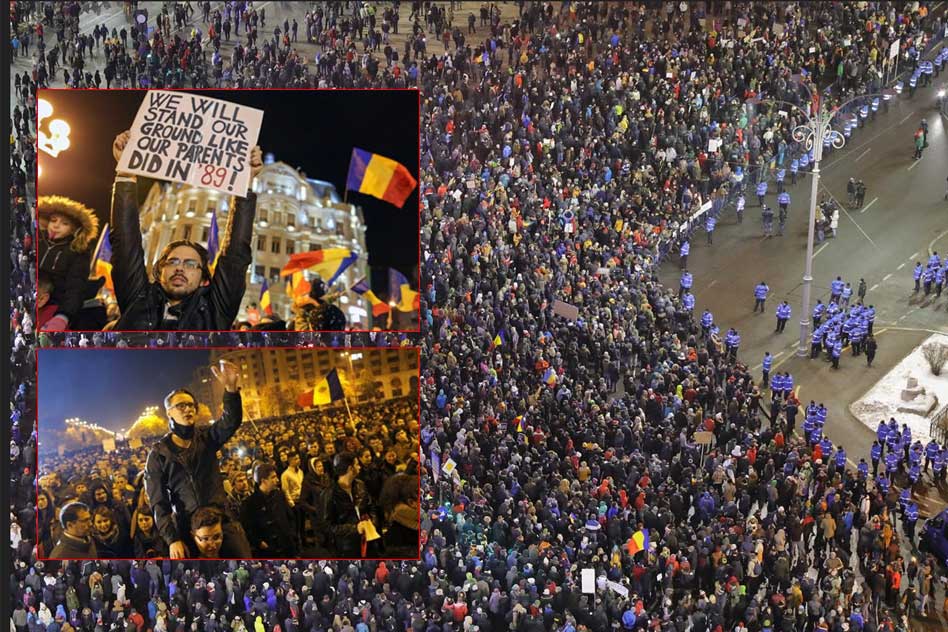
At 10 PM, Law To Protect The Corrupt Was Passed; By Midnight, Thousands Came Out To Stand For Democracy
6 Feb 2017 8:15 AM GMT
Hundreds of thousands of people marched through Romania’s streets in the past few days. Modest estimates say there were at least 500,000 protestors. The demonstrations were the largest since the fall of communism in Romania in 1989.
What initially began as anti-corruption rallies, the protests have evolved into massive anti-government demonstrations unlike anything seen in eastern Europe in decades.
Events leading to protests
Late night on 31 January 2017, the Romanian government passed an emergency ordinance which weakened the country’s anti-corruption laws. Among other controversial measures, this ordinance decriminalised corruption involving government officials in cases where the financial damage was less than $48,500.
Government officials argued that the laws were aimed at “easing overcrowded conditions in prisons”, but the public was unconvinced. Many believed the intention behind the ordinance was to help convicted politicians, and those under investigation, escape justice.
The news broke out at 10 pm, and the response by Romanians was instantaneous. By midnight, braving freezing temperatures, over 12,000 were marching on the streets of the Romanian capital, Bucharest, and another 10,000 were protesting across the country.
Corruption in Romania
Romania, a country of 19 million people, is one of the poorest in the 28-member European Union, and has been battling rampant corruption for years. Hundreds of officials have been imprisoned in recent years and hundreds of others have escaped punishment.
A 2016 report by the Institute for Public Policy (IPP) found that of the 588 MPs elected in previous elections in 2012, 15% were either under investigation for graft, had already been convicted, or chose to step down for other positions. The corruption of the politicians translated into the inefficiency of the Parliament – which the IPP found to be the most inefficient of the post-1989 Parliaments (1989 was when communism fell across eastern Europe).
However, over the past decade, Romania has experienced remarkable success in its battle against corruption, thanks to a number of independent anti-corruption agencies. These agencies have investigated and indicted hundreds of public officials – including former prime ministers and members of the government.
Politics of Romania
Romania follows a semi-presidential system where the President is the head of state while the Prime Minister is the head of government. As such, the Prime Minister is nominated by the President after consultation with the party which holds an absolute majority in the Romanian Parliament.
In the 2016 Romanian legislative elections held in December 2016, the Social Democratic Party won most of the votes and seats. The Social Democratic Party has been ruling Romania since December. Presently, the Prime Minister is Sorin Grindeanu (of the Social Democratic Party) while the President is Klaus Iohannis (an Independent).
The relationship between the President and the PM has been icy, particularly because President Iohannis refused to name the leader of the Social Democrats – Liviu Dragnea – as Prime Minister due to his involvement in corruption scandals.
Reactions to the protests
Many countries have voiced concerns about the growing intensity of the protests. The President of the European Commission has said, “The fight against corruption needs to be advanced, not undone … We are following the latest developments in Romania with great concern”.
President Iohannis took to Facebook to voice his support for the protests. He wrote: “Dear Romanians, today is a day of mourning for the rule of law, which has got a strong blow from the enemies of justice, truth and anti-corruption fight … [The government has ignored] the dreams of millions of free Romanians who want to live in a country freed from corruption … [It] has cancelled the work of thousands of brave and honest people from the Romanian judicial system who have proved in the past years that nobody and nothing is above the law.”
Victory – but the protesters refuse to disperse
After five days of mass protests, the Romanian government agreed to withdraw the controversial ordinance on 4 February 2017. “We will hold an extraordinary meeting on Sunday to repeal the decree, withdraw it, cancel it,” Prime Minister Sorin Grindeanu said.
News of the repeal was met with widespread celebrations across the country. However, protesters refused to disperse. They declared that they would continue to fight against the government who they labelled as “inept” and “corrupt”. One protester told Time, “It’s too late … Their credibility is zero.”
As of 6 February 2017, protests continue in Romania, and they are growing in numbers every hour.
 All section
All section













